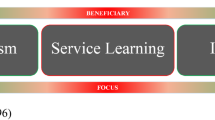Abstract
This empirical study reports the implementation and assessment of service learning in management education. Principles of Management students worked in teams to support Campus Kitchens, a national program affiliated with colleges and universities, in recovering surplus food and delivering it to community members. Student perceptions regarding civic engagement and social responsibility, application of skills, and professional development were assessed. Two complete cycles of implementation and assessment are chronicled. The sample size for Cycle 1 was 123 students and for Cycle 2 the sample size was 91 students. The authors describe how empirical as well as anecdotal data drove the changes made to improve the service-learning experience.
Similar content being viewed by others
References
Bailey, J. R. (ed.): 2005, ‹Service-Learning [Special issue]’, Academy of Management Learning & Education, 4(3)
Bureau, U. S. C.: 2006, American Factfinder. Retrieved August 10, 2006, from http://www.factfinder.census.gov
Campus Kitchens Honored Nationally and Regionally: 2007, Minnesota State University, Mankato (MSU). Retrieved on January 1, 2007 from http://www. mnsu.edu/news/read.php?id = old-1160764002
Campus Kitchens What We Do: 2007, Retrieved February 3, 2007 from (http://www.campuskitchens.org/whatwedo.php)
Clients, Campus Kitchen, SLD&SL: 2007, Minnesota State University, Mankato. Retrieved on January 1, 2007 from http://www.mnsu.edu/sldsl/kitchen/clients.html
Fink L. D. (2003). Creating Significant Learning Experiences: An Integrated Approach to Designing College Courses. San Francisco: Jossey-Bass
Furco A. (1996). Service Learning: A Balanced Approach to Experiential Education. Washington, DC: Corporation for National Service
Godfrey P. C., Grasso E. T. (eds.): (2000). Working for the Common Good: Concepts and Models for Service Learning in Management. Washington, DC: American Association for Higher Education
Hazen M. A., Cavanagh S. J., Bossman L. (2004). Teaching with Mission: Personal Development, Team Building, and Social Responsibility. Journal of Business Ethics 51(4): 373–386
Ishikawa K. (1985). What Is Total Quality Control? The Japanese Way (D.J. Lu, Trans.). Englewood Cliffs, NJ: Prentice-Hall, Inc
Kenworthy-U’Ren, A: 2005, ‹Toward a Scholarship of Engagement: A Dialogue Between Andy Van de Ven and Edward Zlotkowski’, Academy of Management Learning and Education 4(3), 355–362
Kenworthy-U’Ren A. L. (2000). Management Students as Consultants: A Strategy for Service-Learning in Management Education. in P. C. Godfrey, E. T. Grasso (eds.), Working for the Common Good: Concepts and Models for Service-Learning in Management. Washington, DC: American Association for Higher Education
Kohls J. (1996). Student Experiences with Service Learning in a Business Ethics Course. Journal of Business Ethics 15(1): 45–57
Kolenko T. A., Porter G., Wheatley W., Colby M. (1996). A Critique of Service Learning Projects in Management Education: Pedagogical Foundations, Barriers, and Guidelines. Journal of Business Ethics 15(1): 133–142
O’Brien, D. L. and H. T. Aldeen: 2006, Hunger in 2006: America’s Second Harvest – The Nation’s Food Bank Network Fourth National Hunger Study
Papamarcos, S. D.: 2002, ‹The “Next Wave” in Service-learning: Integrative, Team-Based Engagements with Structural Objectives’, Review of Business 23(2), 31–38
Papamarcos S. D. (2005). Giving Traction to Management Theory: Today’s Service-Learning. Academy of Management Learning & Education 4(3): 325–335
Steiner S. D., Watson M. A. (2006). The Service Learning Component in Business Education: The Values Linkage Void. Academy of Management Learning & Education 5(4): 422–434
Strategic Plan, College of Business-Minnesota State University, Mankato: 2007, Retrieved January 22, 2007 from http://www.cob.mnsu.edu/college/strategicplan.html
Tucker M. L., McCarthy A. M., Hoxmeier J. A., Lenk M. M. (1998). Community Service Learning Increases Communication Skills Across the Business Curriculum. Business Communication Quarterly 61(2): 88–99
Weber, P. S. (personal communication, September 9, 2005)
Weber P. S., Sleeper B. (2003). Enriching Student Experiences. Teaching Business Ethics 7(4): 417–435
Weber, P. S., J. E. Weber, B. J. Sleeper and K. C. Schneider: 2004, ‹Self-Efficacy Toward Service, Civic Participation and the Business Student: Scale Development and Validation’, Journal of Business Ethics 49(4), 359–369
Wittmer D. P. (2004). Business and Community: Integrating Service Learning in Graduate Business Education. Journal of Business Ethics 51(4): 359–371
Zlotkowski E. (1996). Opportunity for All: Linking Service-Learning and Business Education. Journal of Business Ethics, 15(1): 5–19
Author information
Authors and Affiliations
Corresponding author
Rights and permissions
About this article
Cite this article
Flannery, B.L., Pragman, C.H. Working Towards Empirically-Based Continuous Improvements in Service Learning. J Bus Ethics 80, 465–479 (2008). https://doi.org/10.1007/s10551-007-9431-3
Received:
Accepted:
Published:
Issue Date:
DOI: https://doi.org/10.1007/s10551-007-9431-3



